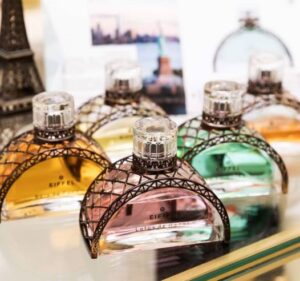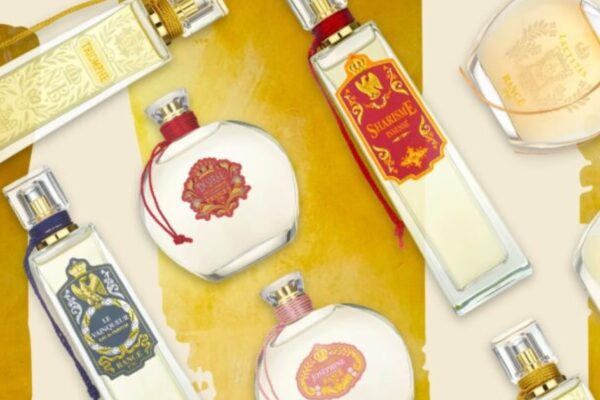Niche perfume focuses on a specific segment that is not catered for by mass perfume production. If you are driven by the unusual, seek creativity and uniqueness, then you need to explore the world of niche perfume. The key factors that drive the production of niche perfume are creative freedom and experimentation, rather than fulfilling market demands. This concept of niche perfume, therefore, implies genuine originality and invites you to experience the emotions and feelings that inspired the perfumer during each creation.
The Concept of Niche Perfume
Niche perfume is made from rare, exotic, and exquisite ingredients that exude an interesting and special kind of scent that is rare to find. The higher concentrations of perfume extracts and the level of natural ingredients it contains are the key factors that differentiate niche perfume from mass commercial perfume.
In preserving the ‘unique’ concept, niche perfume houses opt for a limited and selective approach to distribution. Unless you live in a city that houses niche perfumeries, it is unlikely that you will come across niche perfume. Personally, I first discovered niche perfume during my trip to Firenze in 2018. The buying experience in niche perfumery boutiques is fascinating and you experience a whole new world of olfactory indulgence. The passion and the in-depth knowledge that the boutique assistants transmit make your buying experience way more touching.

I continued to develop a heightened appreciation for niche perfume whilst visiting Budapest (Cherry Garden, Madison), Sorrento (Sabina Scents – Profumeria Artistica), and Paris (Goutal, Franck Boclet).
Here I discovered some of the most interesting and fascinating niche perfume brands, like Nasomatto, Byredo, Etat Libre d’Orange, Jo Malone, Gustave Eiffel, Omnia Profumi, and Rance 1795.
These precious and unique creations promise an exclusive and original scent to those wearing them. Therefore, if you are looking for your signature scent, you should definitely explore niche perfume! This post further explores what niche perfume is and its characteristics.
The Evolution of Niche Perfume
Throughout the years, the significance of perfume developed from being a sacred element used in rituals to a luxury must-have. Perfume is also used in therapeutic remedies. Today, perfume is infused into our daily lives to express our personality.
“Perfume is the art that makes memory speak”
Francis Kurkdjian
The Birth and The Evolution of Perfume
The word “perfume” comes from the Latin “per fume,” meaning “through smoke.” The Ancient Egyptians, also the pioneers of perfume, used perfume during religious and burial ceremonies by burning incense and aromatic herbs. They also used it for beautification purposes. Perfume bottles were also invented by the Egyptians circa 1000 B.C.
The ancient Chinese, Hindus, Israelites, Carthaginians, Arabs, Greeks, and Romans later also embraced a perfume-infused culture. Muslim scientists Jabir ibn Hayyan and Al Kindi were the first to develop techniques for evaporation, filtration, and distillation. Avicenna (Ibn Sina) then introduced the extraction of oils from flowers through distillation. This method is still commonly used nowadays.
In the 11th century, perfume started making its way into Europe, mainly thanks to the Queen Elizabeth of Hungary. This is because, upon her request, scented oils were blended in an alcohol solution. In Renaissance Italy, Catherine de Medici together with her perfumer, Renato Bianco (who later became René le Florentin in France), contributed towards incorporating art in perfume making. After marrying the future King of France, Henry II, thanks to Catherine, perfume was regarded as a luxury that is confined to royalty.
Later in the 16th century, perfume became very popular in France, particularly among the upper class and nobles. King Louis XIV used perfume to impart a pleasant scent in his palace and fountain. He also used to spray perfume to those visiting his palace. In England, perfume was used to eliminate bad smells. For instance, Queen Elizabeth I (1558-1603) ordered the ladies in her court to come up with new combinations of scent.
During 1700, France also started producing perfumed leather accessories such as footwear, gloves, and belts, as well as scented solid soaps. In 1800, the trading of fragrance expanded into large perfume stores like Bertelli in Milan, Paglieri in Alessandria, and Puglisi & Manara in Palermo.
Following the French Revolution, the French society devoted itself to an unbridled luxury that established Paris as the international fashion capital city. Aromatic aldehydes then made their first fragrant debut at the beginning of the 19th century in Rêve D’Or (Golden Dream) by Armingeat and later in Houbigant’s Quelques Fleurs (created 1912) and Lanvin’s Arpège. However, perfumery actually took off on a new, modern trajectory after aromatic aldehydes appeared in Chanel No. 5.
Perfume In The 20th Century
In the 20th century, perfume somewhat lost the luxurious craftsmanship element. This happened as the primary objective of perfume production shifted towards producing abundant fragrances that fulfill consumers’ needs at large. As Jean-Claude Ellena, former in-house perfumer at Hermes, notes in his short book ‘Perfume: The Alchemy of Scent’:
“the priority [of perfume houses being] shifted to the marketing of demand [which]…operates by continually assessing the needs, habits, and interests of consumers…While this approach can be described as innovative, it is not creative.”
This resulted in perfume design being “… guided by a system of olfactory check boxes…the criteria set by the marketing people. …This technique has distanced perfumers from the judgement of their own senses and curtailed their creativity.”
Thankfully, over the past few years, niche perfume brands started appearing at carefully selected perfume specialists or high-end fragrance boutiques. This meant the re-birth of tailor-made craftsmanship in perfume making and so discerning consumers seeking exclusivity and originality could find again perfume created out of artisan passion.
Niche Perfume Celebrities Use
Years back, the first niche perfumes were created for great movie stars and upper-middle-class people who wanted to convey their elevated status within society. Perfume makers, like Guerlain or Coty, soon understood the importance of niche perfumery. As a result, haute couture ateliers started working with Master Perfumers like Ernest Beaux (co-creator of Chanel n. 5), Edmond Roudnitska (Eau Savage by Dior), and Henri Alemeras (Joy by Jean Patou). This also led to various clothing designers producing their own perfume in the 20th century.
To date, various celebrities use niche perfume as their signature scent. The following is a list of sevem popular faces and their signature niche perfume:
- Victoria Beckham – Room Service by Vilhelm Parfumerie, £120 from net-a-porter.com
- Gemma Arterton – Colonia Essenza by Acqua di Parma, £82 from Spacenk.com
- Rihanna – Kilian Love, Don’t Be Shy, $247.99 from Sobelia or €200 from net-a-porter.com
- Kate Bosworth – Gypsy Water by Byredo, £178 from spacenk.com, $266.99 from Sobelia, or €135 from net-a-porter.com
- Meghan Markle – London Wild Bluebell perfume by Jo Malone, $142.99 from Sobelia, or €115 from net-a-porter.com
- Kate Middleton – Illuminum White Gardenia Petals, £80
- Kate Moss – La Maison Hedonique Cerf Blanc, £125
What’s Unique About Niche Perfume?
The way perfume is created is one of the key differences between niche and industrial perfumes. Niche perfume evokes memories and feelings which inspired the perfumer during his unique and intimate creations.

Niche perfumes are crafted from carefully selected raw materials and also contain higher concentrations of extracts and natural ingredients. This results in a heightened olfactory sense and a longer trail of nuances that continue to be revealed over time. In this way, whenever you wear niche perfume you are immediately recognized for your uniqueness. At the same time, you instill a sense of mystery that is only revealed over time.
Very often after Master Perfumers first start working as in-house ‘noses’ of an international perfume house. Thereafter, they end up starting their own niche brand. A typical example is Maison Francis Kurkjdian which was co-founded by Francis Kurkdjian and Marc Chayain in 2009. This was after Francis Kurkdjian had worked for the fragrance producer, Quest International (now part of Swiss-based flavor and fragrance giant Givaudin). In a 2009 Forbes article, Francis Kurkdjian was recognized as one of the top bespoke perfumers. You may explore his fragrances here.
Here are 3 key factors that distinguish niche from industrial perfume.
1. Niche Perfume is an Artwork
Art and creativity are the driving forces of niche perfume creations. Like other artistic creations, niche perfume may not necessarily be accepted and appreciated at large. Perfume making is regarded as art in the sense that, Master Perfumers transform a mix of elements, essences, and emotions to create original and fascinating scented notes.
2. Continuity, Coherence and Uniqueness
According to Silvio Levi, who is a key expert in Artistic Perfumery and the man behind Calé Fragranze d’Autore, each niche perfume creation encompasses three principles:
- Continuity in the sense that, similar to a work of art, niche perfume is created to be appreciated forever, and not to satisfy market demands. Therefore, each niche perfume is inherently timeless and doesn’t go out of fashion.
- Coherence in creating niche perfume in line with the brand’s vision and mission. Coherence applies from the production stage up to the distribution channels. In fact, niche perfumes are available in boutiques that are managed by highly experienced and passionate individuals, in order to ensure that customers enjoy a remarkable buying experience.
- Uniqueness in the sense that each fragrance is an artistic interpretation of a place, an emotion, a story, or a character that particularly inspired the Master Perfumer whilst creating the perfume. When creating niche perfumes, Master Perfumers also utilize exclusive and high-quality raw materials that are scarce in industrial perfumes. In his short book ‘Perfume: The Alchemy of Scent’, the great perfumer and master of the minimal, Jean-Claude Ellena, explains that niche perfumes are “simply unique fragrances, inventions of the mind, which appeal to the olfactory sense”.
3. Unique buying experience
In line with the principle of coherence, niche perfume houses focus on delivering intimate and profound customer experiences that reveal the secrets of their creations in the most fascinating way. The distribution of niche perfumes is also limited to boutiques that employ extremely passionate and very knowledgeable sales assistants who are eager in sharing the origins of the perfumes they sell. All of this is geared towards helping you find the perfume that best represents your personality.
Find Your Signature Scent
Since niche perfumes are exclusive and limited in availability, you can truly find your unique signature scent. You may discover which niche perfume will make your presence and personality unforgettable here.
*This post includes suggestions for products that Lifestyle Exquisite thinks are useful to its readers. If you buy through links on this page, a small commission may be earned.


